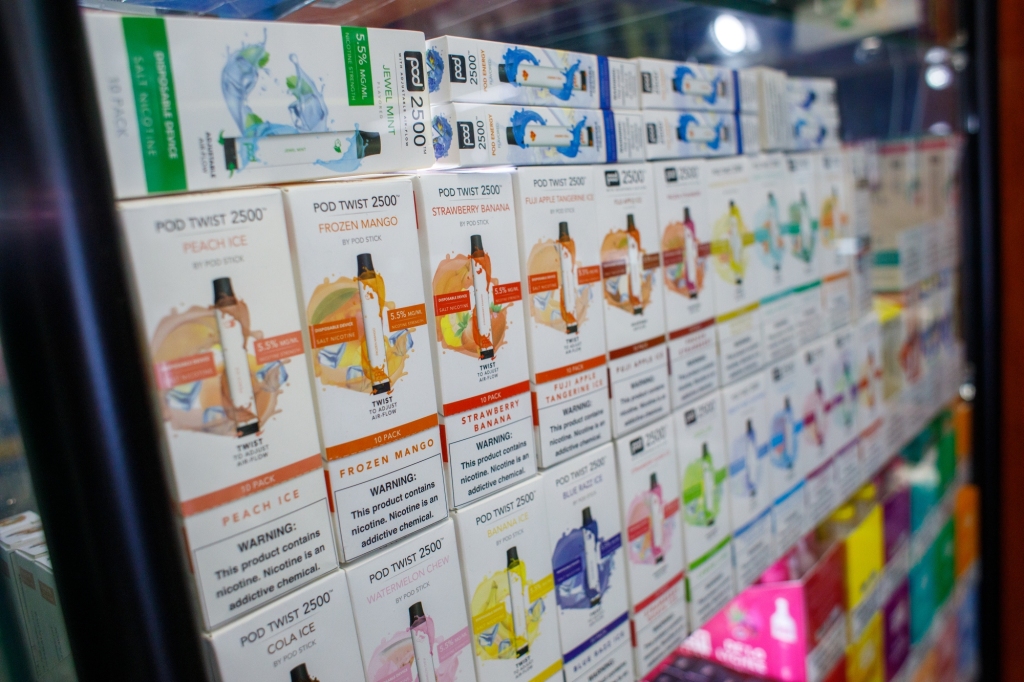San Jose residents will soon no longer be able to find menthol cigarettes or vapes that come in fruity, candied or minty flavors in stores across the city.
The San Jose City Council on Tuesday night unanimously adopted a new ordinance banning the sale of flavored e-cigarettes and menthol cigarettes, with the hopes of preventing easily-enticed teens from getting hooked on nicotine. Once the measure is fully implemented, the Capital of Silicon Valley will become the largest city in the U.S. to ban menthol cigarettes and the biggest city in California to ban flavored vapes.
“I think it’s an important first step to making sure we keep these very dangerous, very addictive products not only out of the hands of our children but really off of their radar,” said Councilwoman Magdalena Carrasco.
Under the new ordinance approved Tuesday, San Jose’s more than 650 tobacco retailers will be banned from selling flavored vapes and menthol cigarettes. It also prohibits new tobacco retailers from opening a store within 500 feet of another smoke shop or within 1,000 feet of a school, park, community center or library. Tobacco retailers have until June 30, 2022, to deplete the newly prohibited products before facing any fines or further enforcement action.
Despite pushback from public health and anti-tobacco advocates, the city opted to carve out an exemption for the sale of flavored hookah.
A year after its implementation, the city plans to review the effectiveness of the ordinance and decide whether any changes should be made, including whether to eliminate the hookah exemption.
“This ordinance isn’t perfect, but the goal is to get it passed, take a look at it and bring back what we need to in a year,” said Councilwoman Pam Foley.
The city council was also expected to vote Tuesday night on a separate proposed ordinance that would prohibit smoking of all kinds — including cigarettes, cigars, vapes and cannabis — inside apartments with three on more units. However, at the beginning of the meeting, the council decided to delay that vote until next month, citing a need to further vet the details of the proposal.
In 2020, California Gov. Gavin Newsom signed a bill banning the sale of most flavored tobacco products statewide, but the tobacco industry led quickly launched a referendum campaign, which put the ban on hold until voters decide whether to enact it in 2022. If approved, the statewide ban will supersede similar city ordinances, though cities could implement stricter regulations.
In the meantime, San Jose joins more than 100 cities across California to adopt their own bans.
At Tuesday night’s meeting, the city council heard from more than 50 San Jose residents and advocates, including teachers, doctors, teens and parents — the majority of whom voiced strong support for the flavored tobacco ban.
Dr. Phil Gardiner, the co-chair of the African American Tobacco Control Leadership Council, told the council that ending the sale of menthol cigarettes would save the lives of Black residents who have historically been targeted by the tobacco industry.
“It’s become clear that menthol cigarettes and flavored little cigars are the main factor of death and disease in the Black community,” he said. “… This has been going on for some 30 years and you have the chance to stop it here.”
Heidi Garland of San Jose urged the council to “put the health of our kids and our residents over tobacco company profits.”
“It’s time to stand up to big tobacco and protect the residents of San Jose like me, my husband and our two sons,” she said.
Alternatively, San Jose smoke shops owners and residents who vape or smoke menthol cigarettes argued that the ban was a form of “government overreach,” adding that they felt it would lead to a “black market.”
Resident Jon D., who was opposed to the ban, compared flavored cigarettes to fruit-flavored alcoholic seltzers, calling those a “gateway to alcoholism.”
“If the ban works, how come my neighborhood sounds like a warzone every Fourth of July despite the ban on fireworks?” he said. “The ban won’t work.”
Nam Nguyen, a tobacco store owner, said the city was targeting the wrong people with the ban, adding that he thought teens would just turn to black-market or online sales.
“Us business owners are not the bad guys for we ID every person,” he said. “We don’t want to sell to kids. We only cater to adults.”










